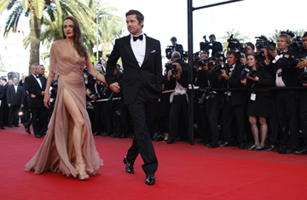
Ooh la la Brad Pitt and Angelina Jolie add some high-voltage glamour
Sex! Violence! The resurrection of a dead movie star! New films from the directors who brought you The Godfather, Pulp Fiction, Spider-Man, Monty Python and the Holy Grail, Last Year at Marienbad, All About My Mother and Crouching Tiger, Hidden Dragon! Plus Brangelina, lovin' and huggin'! All this and a Pixar cartoon!
A marquee groaning with grand masters — Francis Ford Coppola, Quentin Tarantino, Sam Raimi, Terry Gilliam, Alain Resnais, Pedro Almodóvar, Ang Lee, oodles of others — lent the 62nd Festival de Cannes a special air of enticement. The world's largest movie convention shrugged off the worldwide recession (sales of the films on display were reportedly brisk), braved the swine-flu scare (though some cautious Asians stayed home) and put on its tux for another stroll up the steps of the Grand Palais. For 11 of its 12 days, this year's Cannes Film Festival was in large part the Cannes Movie Festival. At a hallowed venue where minimalist art films usually dominate, sensation ran rampant. Blood spurted from necks, noses, guts and, in one memorable gross-out moment, a penis. Extreme characters were everywhere: a vampire-priest in Seoul (Park Chan-wook's Thirst), a French crime lord in Hong Kong (Johnny Hallyday in Johnnie To's Vengeance), a madly grieving mother who mutilates herself and her husband (Lars von Trier's Antichrist) and a demonic beast summoned by a dead gypsy (Raimi's studiously schlocky horror movie, Drag Me to Hell).
In the end, though, order was restored. Jury president Isabelle Huppert and her panel bestowed most of their laurels on challenging art films, not movies that strain to entertain. The White Ribbon, Austrian director Michael Haneke's panoramic portrait of a German village just before World War I, took the Palme d'Or; Jacques Audiard's Un Prophète, a gritty, absorbing drama of warring Arab and Corsican factions in a French prison, copped the runner-up Grand Jury prize. The performance categories also honored French and German stars: Charlotte Gainsbourg in Antichrist, Christoph Waltz as a conniving German colonel in Tarantino's Inglourious Basterds. No American won anything.
A film list logjammed with auteur star quality carries its own daunting expectations: this would be either the most rewarding Cannes ever, or one of the most disappointing. The 62nd edition tended to the latter. After the opening-night delight of Pete Docter's Up — Pixar at its most emotional and endearing — the festival ran mostly downhill. In the works of some of its top talent, Cannes 62 was like an A-list dinner party where the conversation isn't all that sparkling and a few of the guests pass out after throwing up in their soup.
Coppola's Tetro, though an elegant visual construction with tantalizing echoes of the family dynamic in the director's Godfather films, suffered from dramatic inertia and a wan central performance by Vincent Gallo. Lee's Taking Woodstock, about how a rural nebbish with a shrill mom helped get Woodstock rolling, was just a bad trip, as muddling as it was minor. Gilliam's The Imaginarium of Doctor Parnassus reverberated with an even sadder vibe. This was the film Heath Ledger had been shooting when he died early last year; Johnny Depp, Jude Law and Colin Farrell gallantly stepped in to play aspects of the Ledger character. A beau geste, to be sure, but in a forlorn cause, since the movie never comes close to the mad grandeur of Gilliam's Brazil.
Other big films fell short only in relation to their directors' exalted reputations. Broken Embraces, which reunites Almodóvar with Penélope Cruz, tenderly sets a love-after-death story in a moviemaking milieu, and just misses the heights this superb melodramatist usually reaches. Inglourious Basterds, starring Brad Pitt as the leader of a Dirty Dozen-style U.S. Army squad, posited an alternative World War II in which French and American Jews team up to defeat Hitler. The movie is mounted with Tarantino's usual brio, but the tense conversations at its heart too often tend to the logorrheic. Both films are no more than the sum of their imaginative screenplays.
The real magic comes when directors weave a movie spell around their cunning scenarios. Haneke managed that with The White Ribbon, his spare, unsparing tale of collective brutality — the austere portrait of a German mind-set that, he suggests, allowed and abetted the crimes of the Third Reich. Resnais, 87 this week, showed he was still a master of formalist gamesmanship with Wild Grass, which begins as a buoyant romantic comedy, then goes sweetly mad — it's a cunning, anarchic delight.
So is Elia Suleiman's The Time That Remains, which relates 60 years of the Palestinian occupation through the lives of the director and his parents in Nazareth. From this recipe for incendiary propaganda, Suleiman makes a comic soufflé. At a Cannes encrusted with big-name filmmakers, he proved that wit, cinematic finesse and deadpan compassion can make a little guy a festival star.